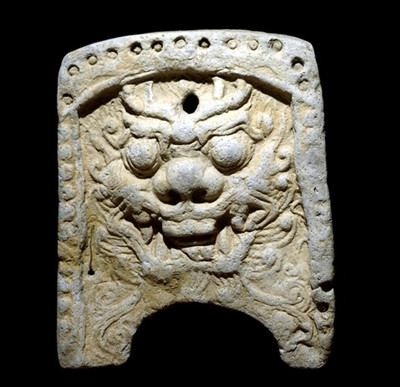(单词翻译:单击)
Tiles like this were sought after not only because they were expensive to make but, above all, because they didn't catch fire like traditional thatch, and burning thatch was probably the greatest threat to any ancient city. By contrast, a tiled city was a safe city, and so it's perfectly understandable that a ninth-century Korean commentator, singing the splendours of the city at the height of its prosperity, should dwell lyrically on its roofs:
贵族使用瓦片,不只因为它价格昂贵,也是看中了它不似传统的茅草般易燃。屋顶着火是所有古代都市最大的隐患之一。而铺盖瓦片的城市是相对安全的。因此,九世纪朝鲜半岛的一位评论家在歌颂城市的华丽与高度繁荣时特别提到了屋顶,这是十分合情合理的:
"The capital Kyongju consisted of 178,936 houses…There was a villa and pleasure garden for each of the four seasons, to which the aristocrats resorted. Houses with tiled roofs stood in rows in the capital, and not a thatched roof was to be seen. Gentle rain came with harmonious blessings and all the harvests were plentiful."
都城庆州共有十七万八千九百三十六座房屋…不同的季节里,王公贵族居住在不同的别墅与花园里。铺盖瓦片的房屋成行成列,不再有一个茅草屋顶。风调雨顺,五谷丰登。
This tile, though, wasn't intended merely to protect you against the "gentle rain". That was the job of the more prosaic, undecorated tiles covering the whole roof. Sitting at the decorated end of a ridge, glaring out across the city, our dragon tile was meant to ward off a teeming invisible army of hostile spirits and ghosts-protecting you not just against the weather but against the forces of evil.
但我们的这块瓦还不仅仅是用来遮挡柔风细雨的,那是覆盖整个屋顶、更加普通、没有装饰的瓦片的工作。而瓦当一般放在屋檐的最前端,俯视整个城市。瓦当上的龙用于抵御无形的妖魔鬼怪大军。不止遮风挡雨,更要驱走邪魔。
The dragon on our roof tile was, in a sense, just a humble foot-soldier in the great battle of the spirits that was being perpetually fought out at roof level, high above the streets of Kyongju. And it was only one of 40 different classes of protective beings, that formed a kind of defensive shield against spirit missiles, and that could be deployed at all times to protect the people and the state.
从某种意义上说,在庆州屋顶发生的这场与邪魔的大战中,我们这片瓦当上的龙顶多只能算个小小的步兵:总共有四十种不同的生物一起组成了防护阵营,随时抵御鬼怪,保卫国家和人民。



